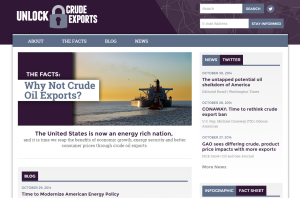“Most Americans still don’t realize that we’re in an age of energy abundance and don’t need to worry about where our next gallon of gas is coming from,” explains Margo Thorning, the senior vice president and chief economist for the American Council for Capital Formation (ACCF).
ACCF, in conjunction with Strata, a research hub on environmental, energy and public land issues, hosted a conference call for media this morning to announce the launch of a new web platform, “Unlock Crude Exports.”
Ryan Yonk, Executive Director of Strata, laid out the goal of the project and why it has been difficult to move on the issue politically: “There’s a lot of misinformation and misunderstanding of the impact. Part of what needs to happen for policy to advance is a better understanding of what the impact would actually be.”
Unlock Crude Exports will be seeking to serve an educational role for both the public and policymakers. William F. Shughart, a fellow at Strata, who also spoke on the call, said it was “crazy” from an economic standpoint to not lift the ban. Indeed, there seems to be an overwhelming consensus among economists that lifting the ban would aid the economy, stabilize global oil prices, and offer geopolitical benefits to the US.
Thorning stated that “policy simply doesn’t match energy realities.” She cited a range of new studies from government, leading think tanks, and economic analysts that indicate crude exports would boost GDP and create new jobs.
An Aspen Institute study from earlier this month found crude exports could increase GDP by $165 billion per year by 2021.
The Brookings Institute showed that lifting the ban could lead to a $600 billion to $1.8 trillion present value boost to GDP depending on when the policy is changed.
Earlier this year, IHS found that allowing exports would increase US production by 3 million barrels per day, cutting the US import bill by $67 billion per year. The study showed increased economic activity would support nearly 1 million new jobs, and across the whole economy, the benefits would deliver an additional $391 in average disposable income per household.
A report from the Government Accountability Office last week found that while crude prices would rise slightly from global market forces, American consumers would pay less for gasoline. The Washington Post cited the study in a Monday editorial that called for the ban to be lifted, dismissing “irrational” concerns from environmentalists.
Calls to lift the ban go well beyond the Washington Post and include leading figures from both sides of the aisle. Two top former economic advisers to President Obama have recently come out in support of exports. Steven Rattner wrote in the New York Times that exports would have benefits across the economy. Larry Summers stated in a speech at the Brookings Institute: “The merits are as clear as the merits with respect to any significant public policy issue that I have ever encountered. And it is an important test of the efficacy of the functioning of our democracy whether within the next nine months we will get to that correct solution.”
With clear signs of benefits to lifting the ban, Unlock Crude Exports will be able to serve as an index of the extensive research backing this change in policy. It’s possible there may be movement on the issue as early as next year, and the new effort from ACCF and Strata will look to build a fact-based dialogue around exports.


